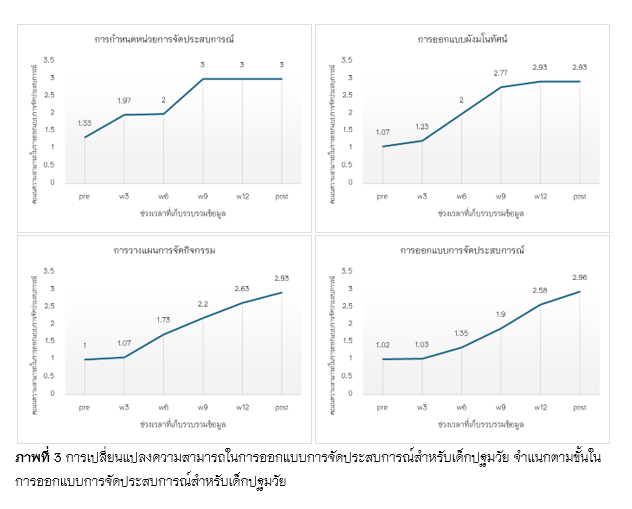การพัฒนาความสามารถในการออกแบบการจัดประสบการณ์สำหรับเด็กปฐมวัย ของนักศึกษาสาขาวิชาการศึกษาปฐมวัย โดยใช้การจัดการเรียนรู้ตามแนวคิดการเรียนรู้เชิงรุกร่วมกับการเรียนรู้แบบผสมผสาน
Main Article Content
บทคัดย่อ
การศึกษาครั้งนี้เป็นการวิจัยกึ่งการทดลองโดยเก็บข้อมูลหลายครั้งในช่วงเวลาที่ต่างกัน ใช้แบบแผนการทดลองแบบ One Group Time – Series Design มีวัตถุประสงค์เพื่อ 1) หาประสิทธิผลของแผนการจัดการเรียนรู้ตามแนวคิดการเรียนรู้เชิงรุกร่วมกับการเรียนรู้แบบผสมผสานในรายวิชาการจัดประสบการณ์การเรียนรู้แบบบูรณาการสำหรับเด็กอายุ 3-6 ปี 2) เปรียบเทียบความสามารถในการออกแบบการจัดประสบการณ์สำหรับเด็กปฐมวัยก่อนและหลัง และ 3) ศึกษาความพึงพอใจต่อการจัดการเรียนรู้ตามแนวคิดที่พัฒนาขึ้น กลุ่มตัวอย่างเป็นนักศึกษาระดับปริญญาบัณฑิต คณะครุศาสตร์ มหาวิทยาลัยราชภัฏนครปฐม ที่ลงทะเบียนเรียนในรายวิชาการจัดประสบการณ์การเรียนรู้แบบบูรณาการสำหรับเด็กอายุ 3-6 ปี รหัสวิชา 1173203 จำนวน 30 คน เครื่องมือที่ใช้ในการเก็บรวมรวมข้อมูล ได้แก่ 1) แผนการจัดการเรียนรู้ตามแนวคิดการเรียนรู้เชิงรุกร่วมกับการเรียนรู้แบบผสมผสาน วิชาการจัดประสบการณ์การเรียนรู้แบบบูรณาการสำหรับเด็กอายุ 3-6 ปี 2) แบบประเมินความสามารถในการออกแบบการจัดประสบการณ์สำหรับเด็กปฐมวัย และ 3) แบบประเมินความพึงพอใจต่อการจัดการเรียนรู้ วิเคราะห์ข้อมูลโดยใช้สถิติบรรยายและการทดสอบ Wilcoxon signed-rank
ผลการวิจัยที่สำคัญมีดังนี้ 1) ดัชนีประสิทธิผลของแผนการจัดการเรียนรู้เท่ากับร้อยละ 98.30 2) ความสามารถในการออกแบบการจัดประสบการณ์สำหรับเด็กปฐมวัยของนักศึกษาสาขาวิชาการศึกษาปฐมวัยหลังได้รับการจัดการเรียนรู้มากกว่าก่อนได้รับการจัดการเรียนรู้อย่างมีนัยสำคัญทางสถิติที่ระดับ .05 (Z=465, p < .001) และ 3) ความพึงพอใจในภาพรวมที่มีต่อการจัดการเรียนรู้ตามแนวคิดการเรียนรู้เชิงรุกร่วมกับการเรียนรู้แบบผสมผสาน อยู่ในระดับมากที่สุด (M= 4.73, SD=0.54)
Downloads
Article Details

อนุญาตภายใต้เงื่อนไข Creative Commons Attribution-NonCommercial-NoDerivatives 4.0 International License.
เอกสารอ้างอิง
Alamri, M. M. (2022). The effectiveness of active learning strategies in improving students’ performance and engagement: A meta-analysis. Journal of Educational Research and Practice, 12(2), 120-135.
Baka, S. (2015). Creating a mathematics program lesson on basic data analysis for Mathayom 6 students. (Master’s thesis, Faculty of Science, Burapha University). [In Thai]
Bender, L. (2020, March). Key messages and actions for COVID-19 prevention and control in schools. Retrieved from https://www.who.int/publications/m/item/key-messages-and-actions-for-covid-19-prevention-and-control-in-schools
Best, J. B. (1986). Cognitive psychology. Minnesota: West Publishing Co.
Bonwell, C. C., & Eison, J. A. (1991). Active learning: Creating excitement in the classroom. Washington, D.C.: The George Washington University, School of Education and Human Development. Retrieved from https://eric.ed.gov/?id=ED336049
Boonkhum, P. (2014). The development of a programmed instruction in mathematics on “integer system” for Matthayomsuksa I students. (Master’s thesis, Faculty of Science, Burapha University). [In Thai]
Brown, T., Smith, J., & Lee, H. (2020). Active learning strategies in early childhood education: A comprehensive study. Journal of Early Childhood Research, 18(3), 225-240.
Hazzan, O. & Lapidot, T. (2004). Construction of a professional perception in the" Methods of Teaching Computer Science" course. ACM SIGCSE Bulletin, 36(2), 57-61.
Huang, Y., Ding, X., & Li, J. (2022). Blended learning in the era of COVID-19: A study of higher education students' perceptions. Journal of Educational Technology, 19(3), 45-58.
Khan, A., Javed, M. Y., & Rehman, S. (2023). Enhancing critical thinking skills through active learning strategies: A study in higher education. International Journal of Educational Development, 88, 102611.
Korbuakaew, T. (2020). The development model of online learning resources to encourage knowledge management of student in education Faculty at Suan Sunandha Rajabhat University. Journal of Educational Studies, 14(2), 80-99. [In Thai]
Lee, J., Kim, Y., & Park, S. (2023). The impact of blended learning on student performance: Evidence from a pandemic situation. Education and Information Technologies, 28(2), 321-340.
Lee, M. & Kim, S. (2019). Blended learning approaches in higher education: A study on student satisfaction and learning outcomes. International Journal of Educational Technology, 10(2), 135-150.
Lo, C. K. & Hew, K. F. (2020). The impact of flipped classroom pedagogy on university students’ academic performance and perceptions: A meta-analysis. Educational Research Review, 30, 100316.
Ministry of Education, Thailand. (2018, September). Use The Educational Standards for Early Childhood Education, Basic Education, and Basic Education at Special Education Centers. The Government Gazette. Rule number 135 session number 235. [In Thai]
Ministry of Education, Thailand. (2019, April). Early Childhood Development Act A.D. 2019. The Government Gazette. Rule number 136 session number 56. [In Thai]
Nakhon Pathom Rajabhat University. (2019). Nakhon Pathom Rajabhat University strategic plan 2019 – 2023. Retrieved from https://news.npru.ac.th/u_news/detail.php?news_id=15430&ref_id=S06A [In Thai]
Nguyen, Q., Thompson, C., & Nguyen, L. (2023). The impact of active learning on early childhood education programs. Journal of Education and Learning, 12(1), 45-60.
Nilsook, P. & Wannapiroon, P. (2013). Blended learning management: Proportion of blending. Journal of Technical Education Development, 25(85), 31-36. [In Thai]
Pakdeeroch, C. (2013). The effects of organizing active learning in mathematical process skills on mathematical problem solving ability, critical thinking ability and Self-confidence of Mathayomsuksa III students. (Master’s thesis, Graduate School, Srinakharinwirot University). [In Thai]
Phapatsaro, P. D., Fangkham, B., Changkan, P. P., & Srisanga, P. S. (2023). The design of active learning management activities. Journal of MCU Ubon Review, 8(2), 109-122. [In Thai]
Poowanna, B., Supakesorn, B., & Poowanna, R. (2023). Empowering learning through active learning: Inspiring and enhancing learner skills in the teaching-learning process. Journal of BovornMulti-Education and Human Social Sciences, 4(2), 216-227. [In Thai]
Sinlarat, P. (2014). Principles and techniques of teaching in higher education. Bangkok: Chulalongkorn University Press. [In Thai]
Smith, A. & Johnson, P. (2021). The role of student-centered learning in developing critical thinking skills. Early Childhood Education Journal, 49(4), 289-302. https://doi.org/10.1007/s10643-021-01212-9
Supervisory Division, Office of the Basic Education Commission, Ministry of Education. (2019). Supervision Guidelines for Developing and Promoting Active Learning Management According to the Policy of Moderate Class, More Knowledge. Retrieved from http://academic.obec.go.th/images/document/1603180137_d_1.pdf [In Thai]
Thummanond, C., Visessuvanapoom, P., Suraseth, C., Wintachai, J., Tantixalerm, C., & Tinmala, D. (2020). The effects of using blended learning program on learning engagement of undergraduate students. Journal of Education Naresuan University, 23(2), 140-151. [In Thai]
Tiantong, M. (2006). Development of computer-assisted instruction multimedia lessons for training teachers-instructors and trainers about creating computer-assisted instruction lessons. (Doctoral dissertation, Graduate School, King Mongkut's University of Technology North Bangkok). [In Thai]
Wang, Q., Zhang, L., & Lu, X. (2021). Exploring the effectiveness of blended learning in higher education: A meta-analysis. Computers & Education, 173, 104283.
Wutthiwan, W. (2010). The results of proactive science teaching and learning to promote academic achievement in science and problem-solving ability for students in Mathayom 1. (Master’s thesis, Faculty of Science, Burapha University). [In Thai]


